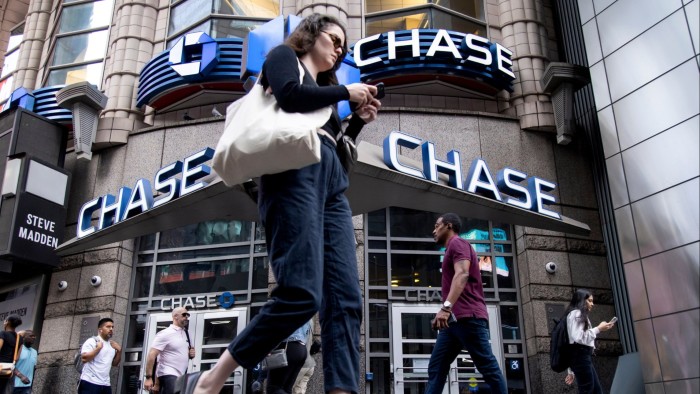Stay informed with free updates
The US Consumer Financial Protection Bureau has sued JPMorgan Chase, Bank of America and Wells Fargo for allegedly failing to protect customers from fraud on payment platform Zelle.
CFPB Director Rohit Chopra accused the three banks, part of a group of seven that jointly control Zelle operator Early Warning, of rushing to get the payments platform online despite competition from other apps such as Venmo and Cash App. Zelle’s operator is also named as a defendant.
The lawsuit escalates the brewing political debate over whether banks should bear greater liability when consumers are defrauded on payment platforms.
The CFPB accused Zelle and the three banks of having limited methods to verify identities, allowing bad actors to move between banks, ignore alerts that could have detected fraud and abandon customers after being defrauded.
The CFPB alleged that customers at JPMorgan, BofA and Wells, the three largest U.S. banks by deposits, lost more than $870 million as a result of these alleged failures. The three banks received fraud complaints from more than 900,000 customers, the lawsuit alleged.
Zelle criticized the CFPB’s “front-page news” figure of $870 million as “misleading,” arguing that some claims may not show fraud after investigation. The company said the allegations were “legally and factually flawed.”
A JPMorgan spokesperson referred to the lawsuit as “a last-ditch effort to pursue their political agenda” and that the CFPB “exceeded its authority by making banks responsible for criminals, including romance scammers.”
BofA said millions of the bank’s customers are using Zelle “without incident” and that the bank strongly disagrees with the CFPB’s case, which would “inflict enormous new costs” on customers and the industry.
Wells had no immediate comment and referred questions to Zelle.
The future of a CFPB lawsuit is uncertain as the agency, which has faced calls from some Republicans to be abolished, is set to come under new leadership once Donald Trump is back in the White House. The president-elect has promised to ease regulations in a number of sectors.
Zelle said that “the timing of this lawsuit appears to be determined by political factors unrelated to Zelle.”
Jaret Seiberg, a financial research analyst at TD Cowen, said the lawsuit “could survive the inauguration, although much will depend on Trump’s choice for CFPB director.”
Zelle was launched in 2017 as a peer-to-peer payment system that can make instant money transfers. However, the speed of transactions has made it a popular tool for would-be scammers, tricking customers into sending money, known as authorized push payment fraud. The schemes include romance scams and the impersonation of government officials or agencies.
Seiberg wrote in an investigation that the banks have a strong defense in the case “as much of the battle is over authorized transactions.”
Early Zelle ads from the banks touted the service as secure because “it was backed by the banks, so you know it’s secure.”
One of the biggest problems was that users were allowed to sign up for multiple accounts with little verification, the lawsuit alleged. Until 2023, the lawsuit alleged, Zelle regularly allowed “bad actors” to sign up for accounts with fake emails that allowed fraudsters to impersonate major corporations and government agencies.
Users said they were scammed by what appeared to be official accounts from one of the three banks or Zelle itself, the CFPB said.
In other cases, banks regularly denied refunds to customers, even in cases where customers claimed their devices had been stolen and thieves had made unauthorized transfers, the CFPB said.
Unlike disputed debit and credit card transactions, the rules for bill-to-bill refunds in the US are less clearly defined than in other countries. Britain set a precedent earlier this year when it imposed new demands on banks to reimburse victims of this APP scam up to £85,000.

